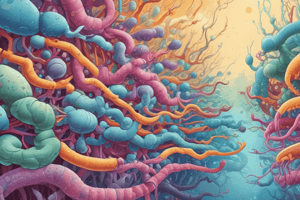Podcast
Questions and Answers
Which primary dye is used for spore staining?
Which primary dye is used for spore staining?
- Malachite green (correct)
- Safranin
- Methylene blue
- Crystal violet
What role do endospores play in bacteria?
What role do endospores play in bacteria?
- Resistance to environmental factors (correct)
- Reproduction
- Photosynthesis
- Nutrient absorption
Which genera include pathogenic spore-forming bacteria?
Which genera include pathogenic spore-forming bacteria?
- Escherichia and Staphylococcus
- Lactobacillus and Streptococcus
- Bacillus and Clostridium (correct)
- Pseudomonas and Klebsiella
Where can central endospores be found in a cell?
Where can central endospores be found in a cell?
Which characteristic makes endospores difficult to stain using normal techniques?
Which characteristic makes endospores difficult to stain using normal techniques?
Which process helps the primary dye to penetrate the spore wall?
Which process helps the primary dye to penetrate the spore wall?
What is the appearance of the spore within vegetative cells after staining?
What is the appearance of the spore within vegetative cells after staining?
What can trigger the formation of endospores in bacteria?
What can trigger the formation of endospores in bacteria?
What shape can endospores be based on their appearance?
What shape can endospores be based on their appearance?
Flashcards are hidden until you start studying
Study Notes
Bacteria Staining
- Various stains are used in microbiology to demonstrate spores, flagella, capsules, and granules, and for staining bacteria in tissue sections for identification and diagnosis.
Spore Stain
- Spore staining is applied to bacterial spore formers, specifically Bacillus and Clostridium.
- Endospores are a chemically and physically resistant form of the vegetative bacteria cell.
- Endospores contain little or no ATP, making them dormant.
- Spored bacteria are resistant to desiccation, chemical exposure, extreme heat, etc.
- Endospores are not for reproduction, but rather for survival.
- The stimulation for sporulation and forming spores can vary depending on factors such as nutrient depletion, desiccation, pH, chemicals, temperature, and others.
- Endospores can regerminate into vegetative cells, providing a protective nature.
- Special techniques are required for endospore staining because the spore wall is chemically changed and thickened during sporulation.
Principle of Spore Stain
- The primary dye used is malachite green, a relatively weakly binding dye to the cell wall and spore wall.
- Steaming enhances the primary dye's penetration, allowing it to bind to the spore wall.
- The dye is not decolorized because it is based on the binding of the malachite green and the permeability of the spore vs. cell wall.
Shape and Location
- Endospores can be identified based on their shape (spherical or elliptical), size relative to the cell, and location within the cell.
- Types of endospores include free endospores, central endospores, subterminal endospores, and terminal endospores.
- Endospores can be differentiated based on shape, size, and whether they cause the cell to look swollen or not.
Pathogenic Spore-Forming Genera
- There are two major pathogenic spore-forming genera: Bacillus and Clostridium.
- These genera cause a number of lethal diseases, including botulism, gangrene, tetanus, and anthrax.
- Examples of pathogenic spore-forming bacteria include Bacillus anthraces, which causes anthrax.
Studying That Suits You
Use AI to generate personalized quizzes and flashcards to suit your learning preferences.




